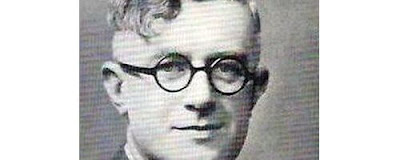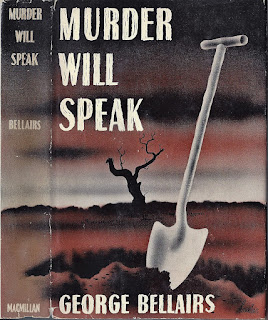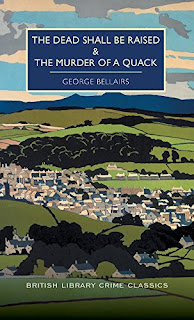A crime
novel by George Bellairs when he was young and sweet and innocent?
Blimey, as his British peers probly said back in the day. But that
would have been for his later novels, when he was old and
curmudgeonly. I started his Inspector Littlejohn series with the
later novels, when Bellairs had become snarky and even nasty in his
outlook toward people, making fun of most of his characters in ways
that would have made their mothers cry. Being old and curmudgeonly
myself, I rather enjoyed most of these verbal caricatures, except
when Bellairs’s cartooning pen went for cheap sniggers at the
expense of certain minorities, such as Jews and gay stereotypes.
After two
such novels, however, in which so many potential suspects could be
eliminated because of their harsh treatment by Bellairs, leaving me
to focus on the few ordinary characters for murdering motive,
opportunity and means—relatively easy peasy--I was about to give up
on further adventures of Scotland
Yard Inspector
Littlejohn—in part also because Bellairs portrayed Littlejohn as
little more than a name, with no physical description or personality.
But a comment by blogger John Norris of Pretty
Sinister Books
acquainted me with an earlier Littlejohn mystery he described as, “a
real detective novel with a plot that was baffling and engaging. It's
a wartime mystery and it dares to break free from the ‘rules’ and
detective novel conventions that make it a standout for Bellairs.”
So I downloaded the Kindle version of The
Dead Shall Be
Raised,
and agree with everything John said. Plus I now have a better
impression of Inspector Littlejohn and some really fine description
of the English north country where the story takes place.
We learn that Littlejohn is a
“large” man, with no other physical description, but this is more
than we’re told in The
Case of the Seven Whistlers and Intruder
in the Dark, published in 1944 and ‘56 respectively.
His wife’s name—Letty—is all
we’re given about her in these two novels, altho from his mention
of needing to call her occasionally it’s apparent he holds her in
high regard. In The Dead Shall Be Raised
(originally titled Murder Will Speak),
which came out in ‘42 and is set in 1940 during the Nazi bombings
of England, we learn early in the first chapter just how high the
regard:
No-one but his wife could have
persuaded Littlejohn to make such a trip on Christmas Eve. One
November night, he had arrived home to find all the windows of his
Hampstead flat smashed and the roof blown-in. Far worse, his wife,
Letty, was a casualty at the local hospital. Luckily, the worst that
German frightfulness had done to her was to cause superficial cuts
and slight concussion, but the detective, tied as he was to duty
owing to the stress of official work, did not feel happy until he had
packed her off to a quiet area.
He’s taking leave to visit
Letty in Hatterworth, where she is staying with a friend from her
schooldays. His train arrives at the station nearest Hatterworth too
late for the bus to that town, but is met by Hatterworth Police
Superintendent Haworth, whose wife is Letty’s friend.
Next evening, while all are
gathered at the Methodist Church where Haworth is part of the choir
performing its annual Messiah concert, a human skeleton is
unearthed on the nearby moorland by Home Guardsmen digging a trench.
News of this find unrealistically interrupts the concert, sending
Haworth and Littlejohn back to the station, where Haworth slips on
the icy steps, and sprains his ankle. Littlejohn graciously accepts
Haworth’s invitation to supervise the investigation into the
twenty-three-year-old murder case unearthed with the bones of the man
assumed to have disappeared after presumably killing his one-time
best friend over a girl.
Littlejohn’s job is
complicated by the dearth of locals still alive who knew the two men
and were familiar with circumstances of the case. He’s aided by two
former police superintendents—Haworth’s father-in-law and his
father, both honorably retired and living nearby. The narrative picks
up speed once the game is afoot, and soon the murder of a potential
witness in the case makes it clear the killer of at least one of the
two rivals is still alive.
Emphasis of the investigation
is procedural, with not much whodunnit mystery, as the list of
plausible suspects has shrunk over the years, and not much
howdunnit, as the first two victims obviously were shotgunned and the
third obviously poisoned. The mystery is whydunnit, and without the
typical sleight of hand many fictional mysteries deploy to confuse
police and readers alike, I found Littlejohn’s incremental
discoveries of motive and circumstances leading to the three murders
more realistic.
Bellairs goes much easier on
the caricaturing in The Dead Shall Be Raised, altho his keen
eye for detail is well displayed—sometimes just with a name, such
as the Rev. Reginald Gotobed,
pastor of Hatterworth Methodist Church. At least Gotobed didn’t have the
“fruity” voice of the minister in Intruder or the “oboe”
voice of his counterpart in Whistlers.Albeit with only three of the
fifty-eight Littlejohn mysteries read, I am getting the
impression Bellairs perhaps has some sort of colorful history with
clergy.
 |
| Bellairs |
He gives a glimpse of his
later caricaturing with this portrait of Bill
o'Three-Fingers, a drunken vagabond who plays a brief but intriguing
minor role: “He was an unpleasant-looking customer. A
general look of disproportion about his face. His mouth, nose and
eyes seemed pushed too near the top of his head. Long, broken nose,
weak, receding chin, loose mouth with yellow, broken teeth and a
long, sloping upper lip. Like a grotesque tailor’s dummy,
constructed with freakish features to attract passers-by.”
Another minor character, the
girl whose affections split apart a friendship that ended in their
deaths, is described twenty-three years later as, “fat and
ungainly, with straight bobbed hair, badly cut, as though some
amateur had put a basin over her head and clipped off all not covered
by it. A round face, with healthy cheeks, grown puffy, and dark,
placid eyes, with a look combining innocence and ignorance. Her
figure had gone altogether. Heavy limbs, protruding stomach, great
breasts flopping beneath her dress. A hard-working woman, weary with
child-bearing and gone to seed before her time. She had five children
and her husband was a plumber.”
Bellairs goes easier on
Mother Earth. Here he rhapsodizes on Hatterworth as he approaches the
town:
...built of local stone, [it]
seemed to fit snugly in the general scene. Its long rows of
three-storied cottages, its public buildings, chimneys and towers and
its open-spaces were ranged along a lower highroad which, from the
hillside, seemed a mere thread winding into the distance...In the
distance, the white smoke of a train, laboriously mounting the ridge
into the heart of West Riding.
And this: “The vast, cold
moor was a rare place for holding secrets. A silence seemed to brood
over it, punctuated now and then by the cries of birds or the shouts
of the Home Guard, still maneuvering vigorously. Even the presence of
so many men over the wide expanse seemed powerless to dispel the
loneliness. The creeping fingers of the powers of destruction
worked unseen, twisting and stunting the vegetation, tearing down the
boundaries erected by man, shattering his habitation and sliding
relentlessly over fields he had cultivated, dragging them back to the
wilderness.”
But then a glimpse of
crystalline beauty, with Superintendent Haworth singing his Messiah
solo: The busy chapelkeeper opened one of the doors leading
from the vestibule into the main street and the exquisite aria
floated out into the still Christmas night and seemed to ring across
the moorland beyond.
The Dead Shall Be
Raised is a short novel, or perhaps a novella, packaged with
Murder of a Quack, another short one published the following
year. I had intended to read only the first, but I liked it so much
I’ve decided to read the other. Not wishing to compete with Yvette
Banek of In
So Many Words for the title of most Littlejohn mysteries
blogged,
I just might keep my impressions of that one to myself. We shall see.
[For
more Friday's Forgotten Books check the links on Patti
Abbott's unforgettable blog]



Matt, This was already on my list to look for, just because it is one of the earlier novels by George Bellairs, but now I will definitely be looking for it. No luck at the book sale though.
ReplyDeleteTime to break down and get the Kindle version, Tracy. ;)
Delete